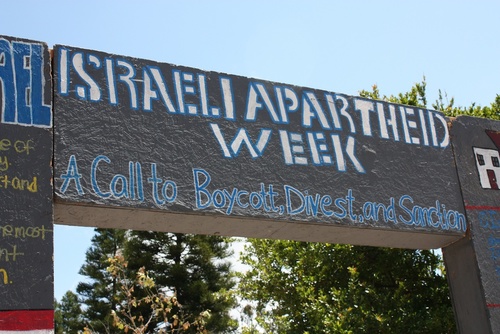Report says such displays neither celebrate ‘Palestinian identity’ nor promote peace, ‘but rather call for the eradication of the Jewish state and demonize its supporters.’
By Dion J. Pierre, The Algemeiner
Campus “apartheid week” events and the so-called “apartheid walls” should be recognized as forms of modern antisemitism, according to a new report from Combat Antisemitism Movement (CAM), an antisemitism watchdog, which calls on college and university leaders to ban the activity.
“Across US campuses in the US, Jewish students are annually subjected to an appalling visual display of contemporary antisemitism in their own academic communities,” CAM writes in Anti-Zionism: The Most Acceptable Modern Day Form of Antisemitism, published on Wednesday.
“These displays do not seek to celebrate Palestinian identity or push for a peaceful resolution to the Israeli-Palestinian conflict but rather call for the eradication of the Jewish state and demonize its supporters through the promulgation of anti-Zionist ideology based on historical revisionism.”
Most apartheid week events are organized by Students for Justice in Palestine (SJP), the report adds, noting that the group is suspected of having ties to organizations the US has designated as terrorist groups. SJP is also a proponent of the boycott, divestment, sanctions (BDS) movement, a cause it lobbies student governments to adopt. Especially problematic, the report explains, are “apartheid walls” that include illustrations and messaging inspired by antisemitic tropes.
This academic year, for example, Tufts University SJP’s wall said “Zionist tactics” are responsible for tensions between police and the African American community, and at Harvard University, a section of the Palestine Solidarity Committee’s (PSC) wall said, “There is no Zionist state without racism, colonialism, ethnic cleansing.”
“The strategy for these groups has been quite clear for some time: creating a litmus test on morality and ethnics based on the renunciation of support for Zionism,” it continues. “Allowing this virulent form of discrimination to persist under the auspices of academic freedom is simply intolerable during a time when antisemitism is rising. If such hateful displays would not be tolerated when directed at other ethnic or religious minorities, Jewish students should not be an exception.”
CAM recommended that colleges and universities adopt the International Holocaust Remembrance Alliance (IHRA) definition of antisemitism, which is used by governments and private organizations around the world and identifies certain expressions of anti-Zionism as antisemitic, including spreading falsehoods about Israel that are rooted in age-old antisemitic tropes of Jewish power and control. CAM also proposed withholding SJP chapters’ share of student fees, a pool of money to which undergraduates contribute involuntarily to subsidize the activities of student clubs, and requiring diversity, equity, and inclusion (DEI) offices to include sessions on antisemitism in the smorgasbord of programs it conducts about every other form of racism and discrimination.
“DEI offices must begin to operate with an understanding that in spaces where antisemitism is allowed to exist, other forms of discrimination will fester and grow,” it added.
CAM’s report comes just under two months after the National Association of Scholars (NAS), a Manhattan think tank that promotes liberal education and higher education reform, published a comprehensive history of the campus BDS movement that documented its reliance on a “deep financial system of progressively oriented businesses and nonprofit foundations.”
The 124 page report includes three case studies on Columbia University, Ohio State University, and University of California-Riverside, assessing the various successes and failures of pro-BDS activists. It also describes BDS’ place within the wider story of the Israeli-Palestinian conflict and “a larger ecosystem of progressive political organizations,” as well as its alleged connection to Palestinian terrorism.
Anti-Zionism and its link to rising antisemitism on college campuses also has been the subject of a report by the Anti-Defamation League, which in 2022 published “Anti-Israel Activism on U.S. Campuses, 2021-2022.” The report said that anti-Zionists have harassed and assaulted Jewish students, citing an incident in which a caravan of anti-Israel activists pulled up to the house of Rutgers University’s Jewish fraternity and cursed and spat on its members.
In March 2022, the ADL reported that antisemitic incidents, many of which are linked to anti-Zionism, increased 40 percent.
